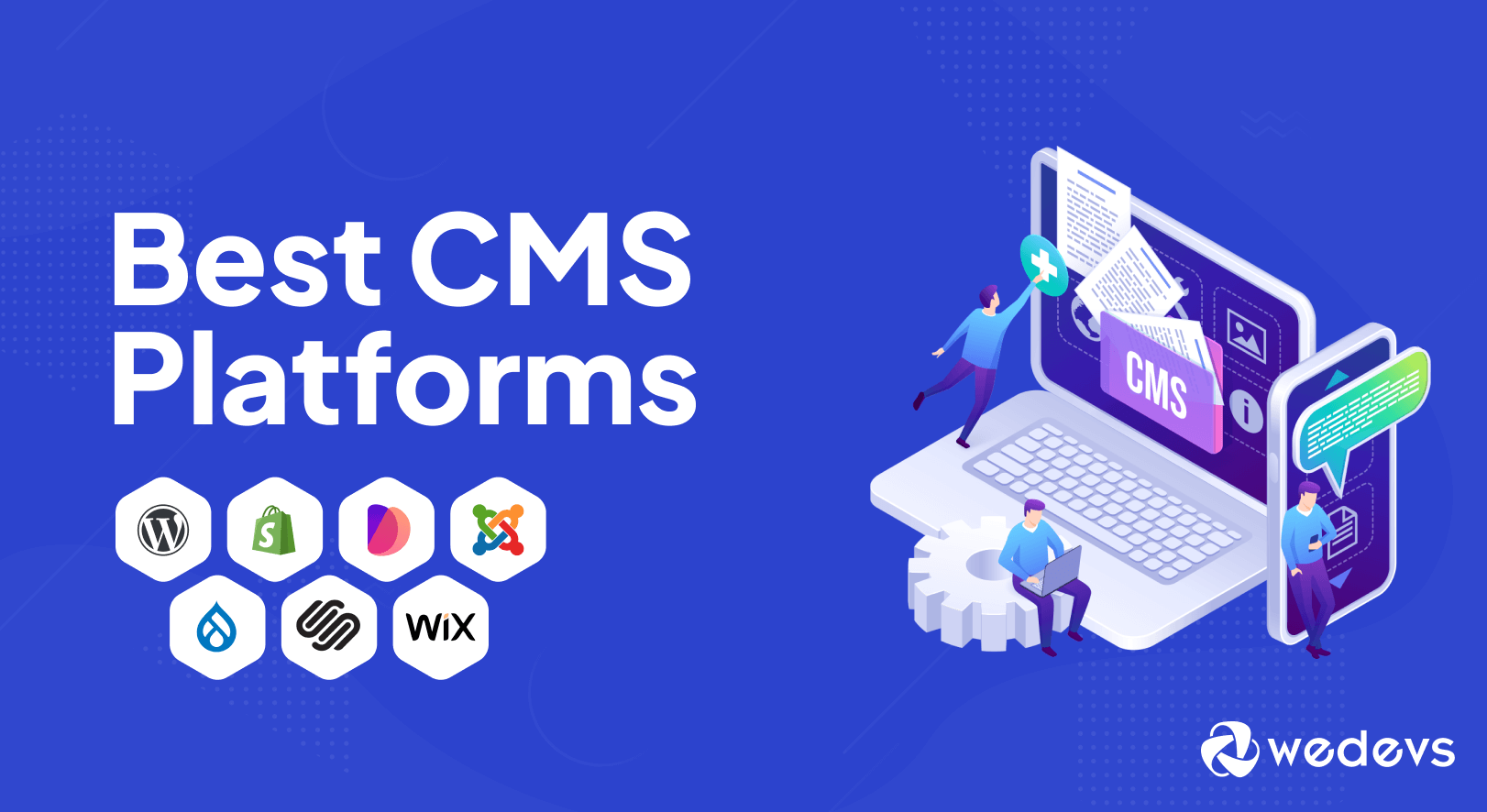
7 Best CMS Platforms to Create a Website in 2026 (Without Coding)
Creating a website is important these days, and a Content Management System (CMS) makes it easier. But with so many options out there, it can be hard to choose. That's where we come in. In this guide, we'll talk about the best CMS platforms to help you pick the right one for you.
First, think about what you want your website to do. Are you making a blog, an online store, or a company website? Each CMS is good for different things, so knowing what you need helps you choose better.
Once you know what type of website you need to build, it'll take only a few moments to choose the right CMS for you as per your needs.
In this comprehensive guide, we will show you the best CMS platforms to create a website in 2026. So, without any further ado, let's check the list and find the most suitable CMS platform for you.
What is a CMS Platform?
A CMS platform, which stands for Content Management System, is a software application that simplifies website creation and management.
Instead of needing to code everything from scratch, a CMS offers a user-friendly interface for creating, editing, and publishing content on your website. This makes it possible for even those without coding knowledge to build and maintain a website.
Here is a list of things that a CMS platform lets you do that:
- Content Creation and Editing: You can build web pages, write blog posts, and add multimedia content without needing to know coding languages like HTML or CSS.
- Easy Management: The CMS platform takes care of the technical aspects, like storing your content and displaying it on your website. You can upload images, organize content, and schedule publications – all through a user-friendly interface.
- Collaboration: If you have a team working on your website, a CMS platform allows different users with assigned permissions to create and edit content.
- Scalability: As your website grows, a good CMS platform can handle increased traffic and allow you to add new features and functionalities.
Basically, A CMS platform bridges the gap between complex coding and user-friendly website creation.
7 Best CMS Platforms to Build Your Website in 2026

In the software industry, things are changing every day. So preparing a CMS platforms comparison post regarding the best ones isn’t an easy task. We made this list considering the number of active installations, live sites, cost, ease of use, functionality, performance, SEO, security, support, etc.
Hope this CMS comparison will help you narrow down your options and choose the best one. Check our list-
- WordPress
- Shopify
- Dokan Cloud
- Joomla
- Drupal
- Squarespace
- Wix
Now, let's dive into the details.
1. WordPress – Best Open Source CMS Platform to Create Any Types of Websites
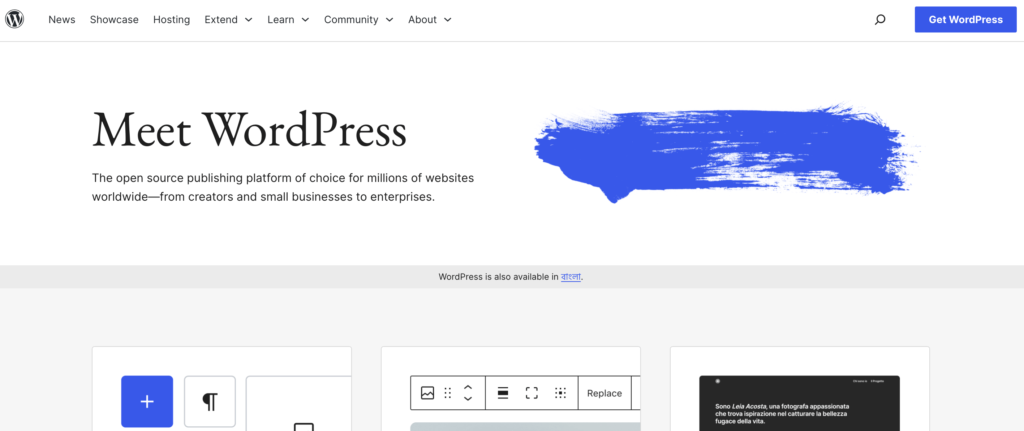
WordPress is a widely-used open-source Content Management System (CMS) known for its versatility and user-friendliness. Originally designed as a blogging platform, WordPress has evolved into a powerful CMS capable of powering various types of websites, from personal blogs and portfolios to eCommerce stores and corporate websites.
Key Features
- Easy to Use: WordPress boasts a user-friendly interface with drag-and-drop functionality, making it accessible even for beginners with no coding experience.
- Highly Customizable: A vast library of free and premium themes and plugins allows you to tailor your website's design and functionality to your exact needs.
- SEO Friendly: WordPress is built with clean code and offers features like meta descriptions and URL management to optimize your website for search engines.
- Large Community & Support: With millions of users worldwide, WordPress benefits from a vast and active community that provides extensive support, tutorials, and resources.
- Scalability: As your website grows, WordPress can scale alongside it. Thousands of plugins and the option for custom development ensure your website can evolve with your business needs.
Pros of WordPress
- Free & Open-Source: The core WordPress software is free to download and use, making it a budget-friendly option for individuals and small businesses.
- Flexibility: The sheer volume of themes and plugins allows for unmatched customization, enabling you to create virtually any type of website imaginable.
- Low Barrier to Entry: WordPress's user-friendly interface makes it a great platform for beginners to learn website building without needing coding knowledge.
Cons of WordPress
- Security Concerns: Being open-source, WordPress requires users to be proactive about security updates and choose reliable hosting providers to minimize security risks.
- Maintenance Needs: Regular plugin and theme updates, backups, and potential security patches require ongoing maintenance, which may be time-consuming for some users.
If you don't know much about WordPress, you can check our What is WordPress blog to know everything about WordPress.
2. Shopify – Best CMS Platform for Creating eCommerce Stores

Shopify is a leading eCommerce platform that empowers businesses to create and manage online stores with ease. Known for its simplicity, scalability, and robust features, Shopify offers everything businesses need to start, grow, and manage their online retail operations effectively.
Key Features
- User-Friendly Interface: Shopify provides an intuitive dashboard and user-friendly interface that allows users to set up and manage their online stores without needing advanced technical skills.
- Fully Hosted Solution: Shopify is a fully hosted platform, which means it handles all aspects of website hosting, security, and maintenance, allowing users to focus on running their businesses without worrying about technical details.
- Extensive App Store: Shopify offers an extensive App Store with thousands of apps and integrations that extend the platform's functionality, including tools for marketing, inventory management, shipping, and customer service.
- Customizable Design: Shopify allows users to customize the look and feel of their online stores using customizable themes and a built-in theme editor, providing flexibility and control over the website's design and branding.
- Secure Payment Processing: Shopify provides built-in payment processing options and integrates with over 100 payment gateways, ensuring secure and seamless transactions for customers worldwide.
Pros of Shopify
- Easy to Set Up and Use: Shopify's user-friendly interface and guided setup process make it easy for businesses to launch their online stores quickly and efficiently.
- Scalability: Shopify scales with businesses of all sizes, from small startups to large enterprises, allowing users to add new products, expand their customer base, and grow their revenue over time.
- Comprehensive Support: Shopify offers 24/7 customer support via phone, email, and live chat, as well as an extensive knowledge base and community forums to help users troubleshoot issues and find answers to their questions.
Cons of Shopify
- Transaction Fees: While Shopify offers various pricing plans, some plans may incur transaction fees on top of credit card processing fees, which can eat into businesses' profits, especially for high-volume sales.
- Customization Limitations: While Shopify allows for customization through themes and apps, users may encounter limitations when trying to implement highly specialized or unique features, requiring custom development or workarounds.
3. Dokan Cloud – Best CMS Platform to Create Online Multivendor Marketplaces

Dokan Cloud is a cloud-based eCommerce platform specifically designed for creating and managing multivendor marketplaces. It enables businesses to set up online marketplaces where multiple independent sellers can list and sell their products within a single platform like Amazon or Etsy.
Key Features
- Multivendor Marketplace: Dokan Cloud's core functionality is to create a platform where multiple vendors can register, manage their stores, and sell their products.
- Vendor Management: Dokan Cloud provides tools for managing vendors, including setting commission rates, defining product categories, and monitoring vendor performance.
- Scalability: Dokan Cloud's cloud-based infrastructure allows your marketplace to scale as the number of vendors and products grows.
- Subscription-Based Pricing: Dokan Cloud offers tiered subscription plans with varying features and vendor capacities, catering to marketplaces of different sizes.
- Commission Management: Dokan Cloud includes built-in commission management tools that allow marketplace owners to set commission rates for each vendor and automatically calculate earnings based on sales.
Pros of Dokan Cloud
- Multivendor Focus: Dokan Cloud excels at creating multivendor marketplaces, offering dedicated features for vendor management and marketplace operations.
- Easy Setup and Management: Dokan Cloud offers a user-friendly interface and guided setup process, making it easy for businesses to launch and manage their multi-vendor marketplaces without requiring extensive technical expertise.
- Scalability: The cloud-based infrastructure ensures your marketplace can handle an increasing number of vendors and products without performance issues.
Cons of Dokan Cloud
- Limited Out-of-the-Box Features: Compared to established eCommerce platforms like Shopify, Dokan Cloud might require additional features to achieve the same level of functionality.
4. Joomla – Best CMS Platform for Developers
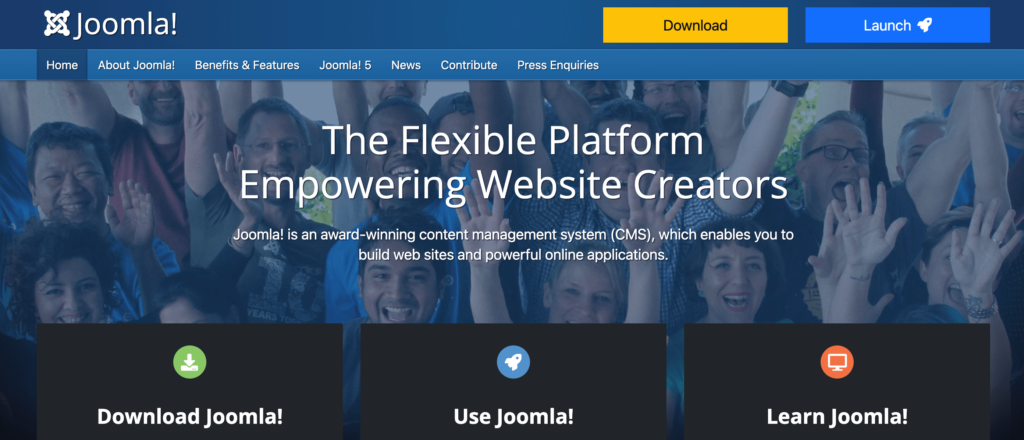
Joomla is one of the award-winning CMS platforms that help you easily create websites and powerful online applications. The first version of Joomla was released in 2005 and got its name and popularity within a very short period of time. After WordPress, Joomla is the biggest CMS platform to create websites.
Key Features
- Flexible Content Management: Joomla offers a flexible content management system that allows users to create and organize content in a variety of ways, including articles, categories, tags, and custom fields.
- User Management: Joomla provides robust user management features, allowing website administrators to create user groups, set permissions, and manage user access levels with ease.
- Extensive Extension Ecosystem: With thousands of extensions available in the Joomla Extensions Directory, users can easily extend the functionality of their websites by adding new features, such as forums, galleries, and e-commerce solutions.
- Multilingual Support: Joomla offers built-in support for multilingual websites, allowing users to create content in multiple languages and manage translations efficiently.
- Advanced Templating System: Joomla's templating system allows users to create and customize website designs using a combination of templates, modules, and components, providing flexibility and control over the website's appearance and layout.
Pros of Joomla
- Versatility: Joomla is suitable for building a wide range of websites, from small personal blogs to large corporate portals, thanks to its flexible architecture and extensive feature set.
- Strong Community Support: Joomla has a large and active community of users, developers, and contributors who provide support, share resources, and contribute to the platform's ongoing development.
- Built-in SEO Features: Joomla includes built-in search engine optimization (SEO) features, such as customizable URLs, meta tags, and SEO-friendly page structures, to help improve website visibility and rankings on search engines.
Cons of Joomla
- Learning Curve: Joomla has a steeper learning curve compared to some other CMS platforms, especially for beginners. Users may need some time to familiarize themselves with its features and functionalities.
- Extension Compatibility: While Joomla has a vast selection of extensions available, not all extensions are regularly updated or compatible with the latest versions of the CMS. Users may encounter compatibility issues when using third-party extensions, requiring them to troubleshoot or seek alternative solutions.
Joomla is a tough competitor of WordPress. Both are popular and powerful CMS platforms. Sometimes, beginners can't decide which platform will be the most suitable option for them. To help them out, we have a blog on Joomla vs WordPress. You can check this blog to know which CMS platform is the best between Joomla and WordPress.
5. Drupal – Top Enterprise CMS Platform
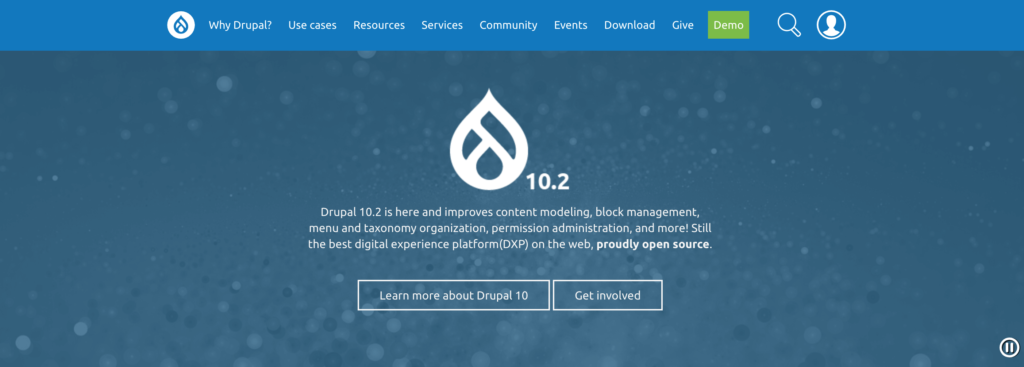
Drupal was first developed as a student community solution but is now available as a fully customized open-source CMS. It's flexible and highly scalable. The software comes with a far wider range of features out of the box than other alternatives. Drupal offers an extremely easy basic installation.
Key Features
- Highly Scalable: Drupal's modular architecture allows for near-infinite customization and expansion through contributed modules. This makes it suitable for websites with complex functionalities and ever-growing content needs.
- Robust Security: Drupal is renowned for its strong security features and focus on regular updates to address vulnerabilities. This makes it a top choice for websites handling sensitive data. User
- Management & Access Control: Drupal offers granular control over user roles and permissions, allowing you to define different access levels for various user groups within your website.
- Content Modeling Flexibility: Drupal provides powerful tools for structuring and managing your website's content, making it ideal for complex data models and information hierarchies.
Pros of Drupal
- Flexibility and Extensibility: Drupal's modular architecture and extensive API support make it highly flexible and extensible, allowing users to build and customize websites and web applications to meet their specific needs.
- Security: Drupal has a strong focus on security, with dedicated security teams, regular security updates, and robust security features built into the core platform, making it a preferred choice for organizations with stringent security requirements.
- Enterprise-Level Features: Drupal offers enterprise-level features, such as multilingual support, workflow automation, content staging, and integration with third-party systems, making it suitable for large enterprises and complex projects.
Cons of Drupal
- Complexity: Drupal's flexibility and power come at the cost of complexity, as managing and maintaining Drupal websites may require more technical expertise and resources compared to simpler CMS platforms. Users may need to rely on developers or Drupal specialists for certain tasks and customization.
6. Squarespace- Best SaaS CMS for Entrepreneurs

Squarespace CMS platform is an all-in-one solution for creating beautiful websites. It was launched in 2004 as a basic drag-and-drop website builder. Today Squarespace has over 1 million users, providing its durability and care for customer satisfaction. One of Squarespace’s unique strengths is its exceptional analytics.
Key Features
- Beautiful Templates: Squarespace offers a wide selection of professionally designed templates that are fully customizable, allowing users to create unique and visually stunning websites without needing design skills.
- Drag-and-Drop Editor: Squarespace's intuitive drag-and-drop editor makes it easy for users to customize their websites' layout, content, and design elements, offering a seamless editing experience.
- Integrated Features: Squarespace includes built-in features such as blogging tools, eCommerce functionality, SEO tools, analytics, and social media integration, eliminating the need for users to rely on third-party plugins or extensions.
- 24/7 Customer Support: Squarespace provides 24/7 customer support via email and live chat, as well as an extensive knowledge base and community forums, to help users troubleshoot issues and find answers to their questions.
Pros of Squarespace
- Easy to Use: Squarespace's user-friendly interface and intuitive editing tools make it easy for users of all skill levels to create and manage their websites without needing technical expertise.
- Professional Design: Squarespace's professionally designed templates and customizable design options allow users to create visually stunning websites that reflect their brand and style.
- All-in-One Platform: Squarespace offers a comprehensive set of tools and features for website building, hosting, domain registration, and online marketing, streamlining the website creation process and reducing the need for users to manage multiple services or platforms.
Cons of Squarespace
- Pricing: Squarespace's pricing plans may be relatively higher compared to some other website-building platforms, especially for users on a tight budget or those looking for more affordable options.
7. Wix- Best CMS for Small Businesses

Wix is a popular website building platform that empowers individuals and businesses to create professional-looking websites with ease, without requiring coding skills. With its user-friendly interface, customizable templates, and integrated features, Wix is a go-to choice for users looking to build websites quickly and affordably.
Key Features
- Drag-and-Drop Editor: Wix offers an intuitive drag-and-drop editor that allows users to easily customize their website's layout, design, and content without any coding knowledge.
- Stunning Templates: Wix provides a vast selection of professionally designed templates covering various industries and styles, enabling users to create visually appealing websites that suit their brand and vision.
- App Market: Wix's App Market offers a wide range of apps and integrations that extend the platform's functionality, allowing users to add features such as e-commerce, contact forms, galleries, and social media integration to their websites.
- Hosting and Security: Wix handles website hosting and provides built-in security features, including SSL encryption, to ensure that websites are secure and accessible to visitors.
Pros of Wix
- Ease of Use: Wix's user-friendly interface and intuitive editing tools make it easy for users of all skill levels to create and manage their websites without needing technical expertise.
- Versatility: Wix is suitable for building various types of websites, including personal blogs, portfolios, business websites, and online stores, thanks to its customizable templates and extensive feature set.
- All-in-One Platform: Wix offers a comprehensive set of tools and features for website building, hosting, domain registration, and online marketing, streamlining the website creation process and reducing the need for users to manage multiple services or platforms.
Cons of Wix
- Limited SEO Control: While Wix provides basic SEO tools and features, users may have limited control over advanced SEO settings, such as customizing URL structures or managing metadata, compared to some other website-building platforms.
Best CMS Platforms – Comparison Table at a Glance
Now you know about the 7 best CMS platforms to create your website. That being said, here we are going to show you a comparison table with all the important data in one place. Hopefully, it will help you to narrow down your choices and finally choose a platform that will match your requirements.
| CMS | Type | Main Purpose | Launched | Pros | Cons |
|---|---|---|---|---|---|
| WordPress | Open Source | General Website & Blogging | 2003 | Wide range of plugins and themes, Large community support | Security vulnerabilities, Learning curve for beginners |
| Shopify | Proprietary | eCommerce | 2006 | Scalability, Integrated payment processing | Transaction fees, Limited customization options |
| Dokan Cloud | Cloud-based | Multivendor Marketplace | 2024 | Easy setup and management, Scalability | Limited customization, Subscription-based pricing |
| Joomla | Open Source | General Website & Online Communities | 2005 | Versatility, Strong user management, Extension ecosystem | Steeper learning curve, Extension compatibility issues |
| Drupal | Open Source | General Website & Complex Projects | 2001 | Flexibility, Strong security features, Enterprise-level features | Steeper learning curve, Complexity |
| Squarespace | Proprietary | General Website & Portfolio | 2004 | Easy to use, Professional design, All-in-one platform | Limited customization, Pricing |
| Wix | Proprietary | General Website & Small Businesses | 2006 | Ease of use, Versatility, All-in-one platform | Design limitations, Limited SEO control |
Most Popular Types of CMS Platforms That You Should Know About
CMS platforms come in various types, each tailored to different needs and preferences. Here are some common types:

01. Open Source CMS
Open source CMS platforms are built on open source software, which means their source code is freely available for anyone to use, modify, and distribute.
Examples include WordPress, Joomla, and Drupal.
These platforms offer flexibility, community support, and a wide range of plugins and themes for customization.
02. Proprietary CMS
Proprietary CMS platforms are developed and owned by companies, and their source code is not freely available. Users typically license the software and may pay ongoing fees for support and updates.
Examples include Adobe Experience Manager and Sitecore.
Proprietary CMS platforms often offer advanced features, security, and support but may come with higher costs.
03. Headless CMS
Headless CMS separates the content management backend from the frontend presentation layer, allowing content to be stored and managed independently from the website or application's design and delivery.
This approach offers greater flexibility and scalability, as content can be distributed across multiple channels, such as websites, mobile apps, and IoT devices. Examples include Contentful and Strapi.
04. Cloud-Based CMS
Cloud-based CMS platforms are hosted in the cloud and accessed via a web browser, eliminating the need for users to install and maintain software on their own servers. These platforms offer scalability, accessibility, and automatic updates but may have subscription-based pricing models.
Examples include WordPress.com and Wix.
05. Enterprise CMS
Enterprise CMS platforms are designed for large organizations with complex content management needs, such as multi-site management, workflow automation, and integration with other enterprise systems.
These platforms often offer advanced security features, scalability, and customization options. Examples include Adobe Experience Manager and Sitecore.
06. eCommerce CMS
eCommerce CMS platforms are specifically designed for building online stores and managing product catalogs, orders, payments, and customer interactions.
These platforms often include features such as inventory management, marketing tools, and integration with payment gateways and shipping providers.
Examples include Shopify, Dokan Cloud, WooCommerce (built on WordPress), and Magento.
07. Micro CMS
Micro CMS platforms are lightweight, simplified CMS solutions focused on managing small-scale content and static websites.
These platforms offer simplicity, speed, and ease of use, making them ideal for personal blogs, portfolios, and landing pages. Examples include Hugo and Netlify CMS.
What to Look for in a CMS Platform While Choosing It for Your Business
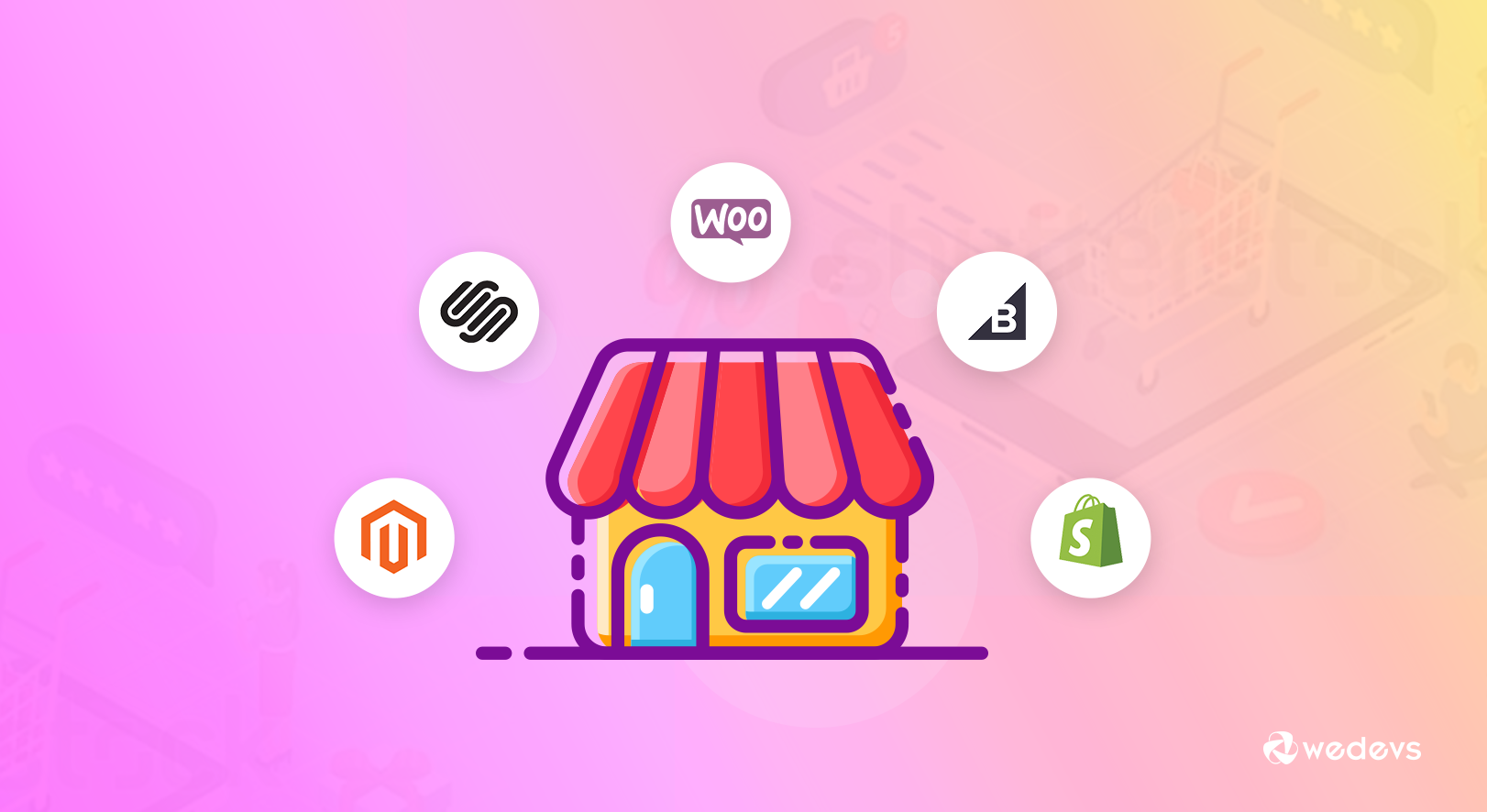
When selecting the right CMS platform for your business, it's crucial to consider several factors to ensure a perfect fit.
Here are some key aspects to keep in mind:
I. Your Business Needs
First and foremost, identify the purpose of your website. Are you creating a simple blog, a complex eCommerce store, or something in between? Different CMS platforms cater to varying functionalities.
For instance, WordPress excels at basic websites and blogs, while Magento is a powerhouse for online stores.
II. Ease of Use
Consider your technical expertise and comfort level. User-friendly platforms with drag-and-drop interfaces and intuitive controls are ideal for beginners (e.g., WordPress). If you have a development team or are comfortable with some technical aspects, you can explore more complex options like Drupal.
III. Scalability
Think about your website's growth potential. Will you need to add more features or handle increased traffic in the future? Choose a platform that can scale alongside your business. Open-source platforms often offer greater scalability through plugins and custom development.
IV. Security
Website security is paramount. Look for a CMS platform with robust security features like regular updates, user access controls, and built-in protection against malware.
V. SEO Friendliness
Search engine optimization (SEO) is crucial for organic website traffic. Choose a CMS that offers SEO-friendly features like clean code, meta descriptions, and URL management.
VI. Design Flexibility
Another important factor when choosing a CMS is how much freedom it gives you to customize and design your site. Platforms like Framer let you experiment with layouts, styles, and visuals, so you can easily create a blog on Framer while staying in full control of the design.
VII. Cost
CMS platforms come with varying pricing structures. Open-source options are free to download but might require additional costs for hosting and development.
Proprietary and SaaS platforms typically have monthly or annual subscription fees. Choose a solution that fits your budget while offering the features you need.
VIII. Support
Reliable customer support is invaluable, especially if you encounter technical difficulties. Look for a CMS platform with a strong support community, tutorials, or readily available customer service.
Best CMS Platforms – Ending Note
CMS made it easy to build a website and manage your content. But you need to find the best CMS platform for your content's structure. In this post, we covered almost all the necessary fields of the top 7 CMS platforms that you should know.
Take a close look, and consider your present capability and future needs. You will surely find yourself in a winning position at the end of the day.
What do you think- is our selection perfect? Compare CMS platforms and share your opinion including which CMS platform you’re using now or going to start with!

